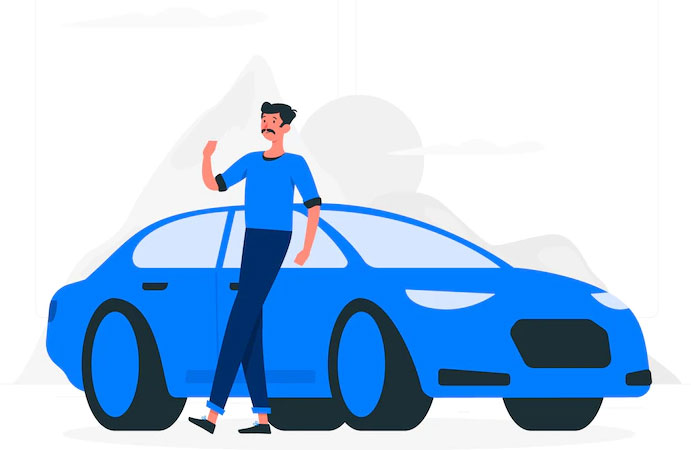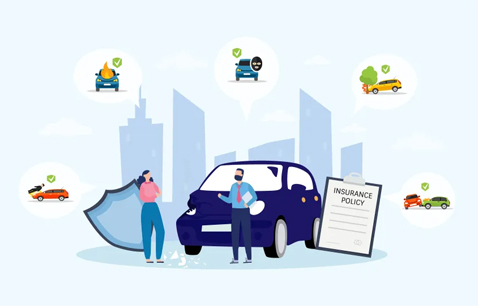Save Up To 70% On
Your Car Insurance In Minutes.
Protecting your car made simple and hassle free!

Get Upto 70% off on premium

Renew Policy in 2 Minutes

Protecting your car made simple and hassle free!



Car insurance is a financial shield that provides coverage for you, your car, as well as the third party, against damages and injuries in case of any accidents.
As stated in the motor vehicles act of 1988, every car owner requires vehicle insurance in India before getting on the road. Otherwise, it may result in facing penalty charges and in some cases, imprisonment as well.
Besides the legal implications, a car insurance policy can also safeguard your financial interests in case of permanent, partial/total disability, or death of the owner/rider and third party.

It covers damages to one's own car, third-party legal liability, theft, along with the personal accident coverage under natural and man-made disasters like fire, earthquake, tornado, damage caused by animals, falling objects, etc.
It covers damages and injuries caused by the insured vehicle, only to a third-party person or property. It is mandatory under the Motor Vehicles Act, 1988, to maintain at least third-party insurance coverage in India.
It provides coverage only for the damage sustained by the insured's four-wheeler in a road accident, natural/man-made calamity, fire, explosion, theft, or any other mishappening. A standalone own-damage car insurance plan aims at offering the insured, flexibility in terms of the insurance provider they want to choose.

In case your vehicle is damaged due to an accident, fire, or self-ignition, you are covered.

In case your vehicle is damaged due to an accident, fire, or self-ignition, you are covered.

This feature makes car insurance more convenient to avail of repair services in case of any damage to your car.

If your car is involved in an accident that results in damage or loss to the property of any third parties, you are protected.

As per the Indian Motors Vehicle Act, third-party insurance is mandatory on all vehicles. Along with that, buying comprehensive car insurance helps you to remain in compliance with regulations and set your mind free too.

Comprehensive car insurance provides you with cover against theft and vandalism. You can get your hard-earned money back if your car gets stolen.

If your car is damaged due to a flood, fire, or earthquake, your car insurance policy will come in handy to claim for the damages.

One of the major advantages of having car insurance is no claim bonus (NCB). It can be available as a discount on your premium, which can make car insurance purchases more affordable.

The entire process of buying/renewing car insurance is simple, quick, and convenient.
Inclusions refer to the risks that are covered under the car insurance policy. Here are some popular inclusions in motor insurance:

Your car insurance policy covers you against financial losses that may occur during an accident or theft. However, there are certain events, which your policy may not cover:
Add-on covers are additional benefits added to your car policy that cover the car against unforeseen expenses. Add-ons, also known as riders, can be included in your insurance policy by paying an extra premium.
There are various types of add-ons offered by insurance companies listed as follows, but you should select the one according to your specific requirements.
Comparing car insurance premium rates can help you understand which insurance plan is the best as per your budget, but it is not the only consideration. You should remember that a low-cost car insurance policy might not be the ideal one for you in terms of coverage. It’s best to do your due diligence, and compare all the features, coverage, and premium rates before making the decision. Here are some points that you should keep in mind while comparing car insurance policies online.
Firstly, you should select the type of policy that you need for your four-wheeler. Compare different car insurance plans online. As the comparison makes it easier to pick the best car insurance plan as per your budget and your needs.
The IDV represents the maximum coverage liability that the insurer undertakes. In the case of theft or total loss of the four-wheeler, the maximum claim amount would be the IDV of the policy. When comparing, make sure you compare the IDV quotes offers from insurance providers to get the best sum insured for your insurance policy.
One common mistake that insurance buyers make is that they read about the policy benefits, but forget to read about the conditions that the policy does not offer. Hence, make sure to understand both inclusions as well as the exclusions, to make an informed decision.
When you buy a motor insurance policy, you should ask your insurer about the claims process. Also, check the claim settlement ratio of the insurer. The claim settlement ratio of a company tells about the number of insurance policies that are settled by paying back the claims in a year.
The following are key factors that determine the premium of a car insurance policy
In the event of a loss, the following are key points on how to claim your car insurance:

 Instant Policy
Instant Policy Right, Coverage & Price
Right, Coverage & Price 100% Claim Assistance
100% Claim Assistance Renewal Management
Renewal ManagementLiability Only Policy (Statutory requirement)
Comprehensive Policy (Liability Only Policy + Damage to owner’s Vehicle usually called O.D Cover)
Fire, Explosion, Self-Ignition, Lightning
Burglary/Housebreaking / Theft
Riot & Strike
Earthquake
Flood, Storm, Cyclone, Hurricane, tempest, inundation, hailstorm, frost
Accidental external means
Malicious Act
Terrorism acts
While in Transit by Rail/ Road, Inland waterways, Lift, Elevator, or Air
Normal wear and tear
Not having a valid driving license during an accident
Driving under the influence of intoxicating liquor/ drugs
Accidents taking place beyond geographical limits
If the vehicle is being used for unlawful purposes
Electrical/ mechanical Breakdowns
The following factors help determine the premium:
Make model and year of manufacturing of vehicle
Place of registration
Cubic capacity of the vehicle
Individual ownership/company-owned
Seating capacity
Claim status and No Claim bonus
Add on covers
The premium may be lesser of one insurer but may have higher deductibles, lower coverage, and lower IDV, which will adversely impact the insured in the event of claim settlement.
It is the maximum amount to be paid by an insurer at the time of claim settlement. It is the sum insured and is fixed at the commencement of each policy period.
This offers complete coverage of the vehicle without factoring in depreciation. It means, that if your car gets damaged following a collision, you will receive the entire cost from the insurer without deduction of depreciation. It covers all-fiber, metal, and plastic parts. There are other add-on covers that can be clubbed together like engine cover, tire cover, return to invoice, RSA, personal belongings, etc.
It is a discount available in the renewal premium offered by insurance companies if a vehicle owner has not made a claim during the last term of the car insurance policy.
Covers the owner of the vehicle against any legal liability arising out of any property damage or bodily injury to third parties. The limit for third-party property damage cover is restricted up to a maximum of Rs.7.5 lakh, whereas there is no limit restriction on third-party bodily injuries.
It is the first amount to be borne by the insured for each and every claim reported. The insurance company has decided that you will pay at the time of a claim settlement. For sub-1500 cc vehicles, it is Rs 1500 and for vehicles above 1500CC it is Rs. 2000.
It covers engine damage due to water ingression or oil leakage.
No.
Total loss means accidental damage to the vehicle where the insurance company’s share is more than 75% of the IDV.
While generally, it is three times, it could vary from company to company.
This covers the cost of replacement when a key is lost or stolen.
The car owner is paid a fixed daily allowance for a certain number of days if the car has been taken to the workshop.
Insurance companies offer a discount on the premium for installing anti-theft devices approved by the Automobile Research Institute of India (ARAI). These devices enhance security and reduce the chances of making a claim, hence adding the benefit of the discount.
Yes, but an inspection of the vehicle is required. However, No Claim Bonus (NCB) can be protected till the expiry of 90 days from the date of expiry.
Legally anyone driving a car must hold a valid driving license. In this scenario, it is the owner's responsibility to ensure that his vehicle is being driven by someone with a valid driving license and that the driver is not under the influence of alcohol or drugs.
According to the Supreme Court order, IRDA has mandated all general insurance companies to offer multi-year third-party insurance to all motor vehicles sold after 1st September 2018. Therefore, instead of single third-party liability plans, insurance companies will offer 3-year third-party liability plans for cars and 5-year third-party liability plans for two-wheelers.
You will have to inform the insurer about this, as the cost of the premium will differ based on the fuel type of your car.